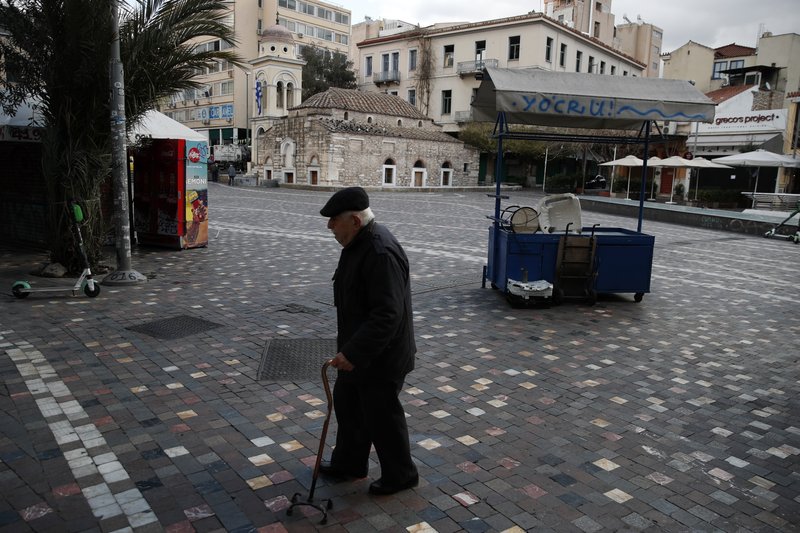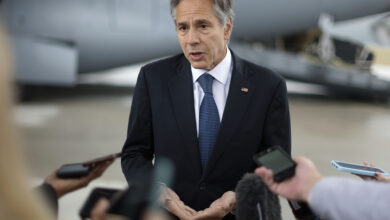
The Latest on the coronavirus pandemic, which has infected more than 169,000 people and killed more than 6,500. The COVID-19 illness causes mild or moderate symptoms but most people, but severe symptoms are more likely in the elderly or people with existing health problems. More than 77,000 people have recovered from it so far, mostly in China.
Serbia’s army troops are being deployed to the country’s borders and streets of the capital, Belgrade, to reinforce a nationwide state of emergency that has been introduced in an effort to try stop the coronavirus outbreak.
Serbia’s Defense Ministry said Monday the soldiers will guard hospitals treating COVID-19 infected patients, border checkpoints, airports and train stations where bigger crowds are expected.
Serbia has closed its borders to foreigners and demanded self-isolation for returning Serbian citizens to up to 28 days, depending which country they visited. The measures also include voluntary isolation for all citizens except for visits to the shops and pharmacies and walking pets. People older than 70 were told not to leave their homes till further notice.
Serbia’s Prime Minister Ana Brnabic said that if people continue to ignore the self-isolation orders, as they appear to be doing in Belgrade on Monday, the government will introduce a police-enforced curfew. Serbia has 55 infected patients.
___
Turkey highest religious authorities says it is suspending Friday prayers and other communal prayers in tens of thousands of mosques across the country in a bid to contain the spread of the new coronavirus.
Ali Erbas, the head of head of religious affairs directorate, said Monday prayers are suspended until the threat from the virus dissipates. He urged worshippers to hold prayers at homes.
In further measures to prevent an outbreak, Turkey’s justice minister said earlier that the country was postponing some court hearings and sending on leave judges and prosecutors above the age of 60.
Turkey, wich has reported 18 confirmed cases of the virus, has stepped up measures to combat its spread.
It has suspended inbound flights from 15 locations, closed schools and universities, ordered bars and night clubs shut and set up locations to quarantine more than 10,300 people returning from pilgrimages to Islam’s holy sites in Saudi Arabia.
___
Greece is imposing a compulsory 14-day quarantine on anyone entering the country and extending shop closures to fight the spread of the coronavirus.
So far, all restaurants, bar and cafes have already shut down, except for deliveries and take-aways. Deputy government spokeswoman Aristotelia Peloni said the expanded closures as of Wednesday would not affect supermarkets, pharmacies, banks or gas stations.
Peloni also said people were required to maintain a two-meter distance from each other in supermarket queues and to avoid cash payments by using credit or debit cards,
He said Prime Minister Kyriakos Mitsotakis and his family had tested negative for the virus. Greece has 331 infected and four deaths.
___
Spain has become the fourth most virus-infected country in the world, surpassing South Korea with a sharp curve of contagion, and closing its borders is a “real possibility” being considered.
The topic will be discussed by European Union members on Monday, according to the country’s interior minister.
Coronavirus cases in Spain rose by roughly 1,000 cases in 24 hours to 9,191 on Monday, and the number of fatalities reached 309.
Minister Fernando Grande Marlaska said a total lockdown could be the next step, after deploying the army to the streets and to clean train stations, ordering 46 million to stay at home and taking over control of private hospitals.
Portugal and Spain have already agreed to halt tourism across their 1,200-kilometer (750-mile) shared border. Goods and workers will still be allowed in and out. About half of the deaths have been in the capital, Madrid.
___
Hungary’s prime minister says the country is closing its borders to foreigners and only citizens will be allowed in. Prime Minister Viktor Orban said Monday in Parliament that international coordination about the border closures is underway.
Orban also said all bars, restaurants and shops will have to close daily at 3 p.m., with only food stores, pharmacies and drug stores allowed to stay open longer.
Cinemas, cultural institutions and nightclubs will also be closed, while sporting events can still be held if organizers assume responsibility, but only without spectators.
Schools were closed to students on Monday, with distance learning programs starting to be implemented. So far, 30 people in Hungary have been infected with one virus-related death.
___
The former Soviet republic of Georgia is banning the entrance of foreign citizens beginning Wednesday in an attempt to stop the spread of COVID-19.
___
European Union leaders will hold a video-conference summit on efforts to contain the spread of coronavirus, which has now infected around 40,000 people across Europe, and claimed some 2,000 lives.
EU Council President Charles Michel, who chairs summits of prime ministers and presidents from the 27 EU nations, said via Twitter on Monday that he was calling on Tuesday what will be the second meeting of its kind in two weeks.
“Containing the spread of the virus, providing sufficient medical equipment, boosting research and limiting the economic fallout is key,” Michel tweeted.
The EU is urging its member countries to put common health screening procedures in place at their borders to limit the spread of the virus, but not to block the transport of important medical equipment.
___
U.K.-based airlines, including British Airways and Ryanair, are scaling back flights dramatically in response to the coronavirus crisis that has seen Europe and the wider world go into lockdown.
EasyJet said it is introducing “further significant cancellations” as a result of the restrictions and “significantly reduced levels of customer demand.” It added that these will continue on “a rolling basis for the foreseeable future” and could result in the grounding of most of its fleet.
BA’s parent company IAG, which also owns Spain’s Iberia, also announced plans to reduce capacity. For April and May, it said it plans to reduce capacity by at least 75 percent from the previous year. It also said it is reducing operating expenses, by grounding surplus aircraft and implementing voluntary leave options.
And Ryanair said its expects that the restrictions will mean the grounding of the majority of its aircraft fleet across Europe over the next seven to 10 days.
__
China is relaxing travel restrictions in the hardest-hit virus province of Hubei, sending thousands of workers back to jobs at factories desperate to get production going again.
The official Xinhua News Agency reported Monday that cities just outside the epicenter ofWuhan were chartering buses to send back to work residents who had returned home for the Lunar New Year in late January.
The move comes as Chinese officials say the outbreak that spread from Wuhan starting in December has mostly run its course domestically, while they remain vigilant against imported cases.
The outbreak of COVID-19 has has a devastating effect on China’s service sector and industries from autos to cell phones, although President Xi Jinping has pledged that economic growth targets for the year will still be met.
Xinhua cited local officials as saying that 750,000 migrant workers alone in the city of Huangguang adjacent to Wuhan have been unable to return to their jobs.
___
Iranian state TV says the new coronavirus has killed another 129 people, pushing the country’s death toll to 853 amid 14,991 confirmed cases.
Iran is struggling to contain the worst outbreak in the Middle East. Monday saw the biggest one-day rise in the death toll since the epidemic began. Even senior officials have been infected.
World Health Organization officials say that Iran’s outbreak is being reported.
___
Belgium’s political parties have agreed to temporary put their differences aside to fight the coronavirus outbreak more efficiently. After months of failed negotiations, opposition parties agreed to grant Prime Minister Sophie Wilmes’ caretaker government special powers for up to six months.
Wilmes said late Sunday on Twitter that her team will be “driven by a sense of duty. This great union is up to the challenges of the moment.”
Belgium has been in a political impasse for months after last May’s general election exposed deep linguistic and regional divisions in the country. Belgium’s first female prime minister, Wilmes was appointed in October to succeed liberal leader Charles Michel, who became president of the European Council.
In an attempt to stop the spreading of the COVID-19 virus, Wilmes’ government has closed schools, bars and restaurants and suspended all sports and cultural events. Belgium has 1,085 confirmed cases and four deaths.
___
The Czech Interior Ministry is calling on all citizens to use any face protection available, especially while shopping and using the public transport.
“Any protection is better than no protection,” the ministry said. It advised people to stay at home, if possible.
Czech Health Minister Adam Vojtech acknowledged over the weekend that the medical sector lacks up to a million respirators.
The government has banned traveling across the country, starting Monday. People still can travel to work, visit doctors or do shopping. The Czech Republic has 298 COVID-19 cases.
___
South Africa will revoke nearly 10,000 visas issued this year to people from China and Iran, and visas will now be required for other high-risk countries that had been visa-free, including Italy and the United States.
Health Minister Zweli Mkhize says a lockdown might be necessary if tough new measures announced Sunday, including travel restrictions and school closings, don’t work. He warns of a high risk of internal virus transmission with “the problem of inequality in our society.”
South Africans worry about the spread of the virus to crowded townships or public transport. Confirmed virus cases have doubled every two days over 10 days to 61, a rate he called “explosive.”
Elsewhere, Africa’s second most populous nation, Ethiopia, has suspended schools, sporting events and other large gatherings for 15 days.
___
Bavarian authorities say that runoff mayoral elections in the southern German state will be conducted entirely by postal vote to reduce risks of infection with the new coronavirus.
Polling stations opened as usual, though with increased hygienic precautions, for the first round of municipal elections on Sunday.
On Monday, though, Bavaria’s state government tightened its restrictions on public life, saying that it would close bars, cinemas and some shops among other things. The regional interior minister, Joachim Herrmann, said that the runoff votes in two weeks will be held “exclusively by postal ballot.”
Among the cities and towns where a runoff vote will be needed is the state capital, Munich, where center-left mayor Dieter Reiter fell narrowly short of the 50 percent support needed to avoid a second round.
___
The government of Kosovo has declared the state of emergency due to the coronavirus threat. Kosovo has 13 COVID-19 cases. It has closed all its borders and suspended flights from its only international airport. The government has closed all schools, cafes, restaurants and gyms and banned mass gatherings.
___
Germany has partially closed its borders with five neighbors, leading to queues at some crossings.
German police launched new controls at the usually check-free borders with France, Switzerland, Austria, Luxembourg and Denmark on Monday. Police turned back some pedestrians at Kehl, across the Rhine river from the French city of Strasbourg.
People who commute across the border to work are still allowed to cross, as can trucks carrying goods, and Germans are being allowed back in. But Interior Minister Horst Seehofer said that people “without a valid reason to travel” wouldn’t be allowed across.
That, for example, ends trips to shops across the border for now.
Denmark shut own border over the weekend – as did two eastern neighbors of Germany, Poland and the Czech Republic. Lithuania’s government said a convoy of some 500 vehicles — mostly Lithuanians, Latvians, Estonians and Ukrainians — will be allowed to enter Poland from Germany and transit toward Lithuania on Monday.
Germany has confirmed over 4,800 infections with the new coronavirus, including 12 deaths.
___
Bangladesh’s government has shut down all all educational institutions and private tutorial centers across the country until March 31.
Education Minister Dipu Moni said at a news conference Monday in Bangladesh’s capital, Dhaka, that the measures were taken as a precautionary step against the coronavirus. Bangladesh confirmed three more cases of infection on Monday, taking the total to eight. ___
Czech authorities are ordering a lockdown of 21 towns and villages in an area some 250 kilometers (150 miles) east of the capital to prevent the coronavirus from spreading.
The health authority in the nearby city of Olomouc barred residents from leaving those places and no one without residency can travel there. The extraordinary measure initially for two weeks includes confining people to their homes except to shop for food and medicine and go to and from work.
The Czech Republic has 298 cases of infection with the virus that causes COVID-19.
The measure comes just hours after the government banned traveling across the country.
___
Iranian news agencies say a 78-year-old member of the Iranian clerical body that chooses the country’s supreme leader has died from the illness caused by the new coronavirus.
He was the latest of several senior Iranian officials to have been infected in the worsening outbreak.
The outbreak has infected nearly 14,000 people in Iran and killed more than 700, with the toll jumping by more than a hundred in the last 24 hours. The real numbers may be even higher, as some have questioned the government’s reporting.
___
The Peace Corps is evacuating all of its volunteers and suspending operations in dozens of countries.
Director Jody Olsen says Sunday’s decision comes as “international travel becomes more and more challenging by the day.” She said the agency wanted to avoid leaving volunteers stranded in host countries.
As of September 2019, the service program run by the US government said it operates in more than 60 countries and has more than 7,300 volunteers and trainees. Volunteers in China and Mongolia have already been evacuated over virus concerns.
Olsen says host country staff will remain in their current roles.
___
The Associated Press receives support for health and science coverage from the Howard Hughes Medical Institute’s Department of Science Education. The AP is solely responsible for all content.
Image: An elderly man walks in Monastiraki square, usually the most crowded area in central Athens, Monday, March 16, 2020. Greek health authorities have warned people to stay home, and have shut down everything from restaurants, bars and cafes to public organized beaches, ski resorts, hair salons and movie theaters, in an effort to curb the spread of the virus. The vast majority of people recover from the new coronavirus. According to the World Health Organization, most people recover in about two to six weeks, depending on the severity of the illness. (AP Photo/Thanassis Stavrakis)




